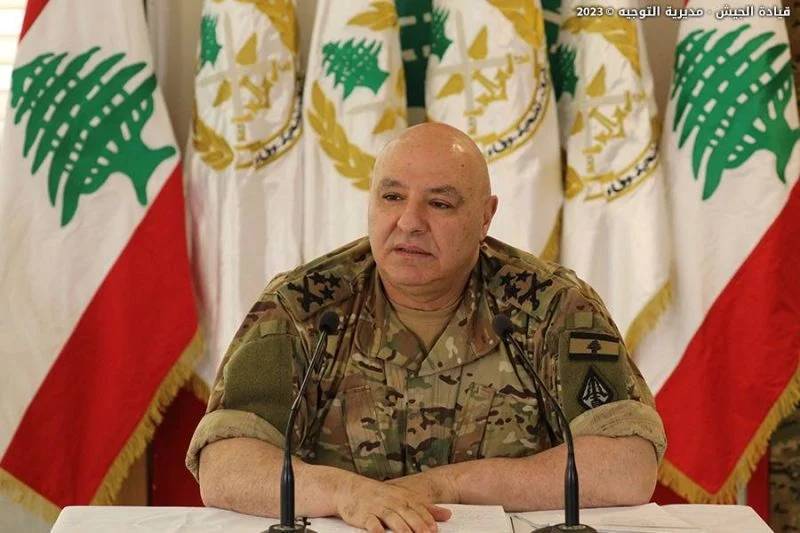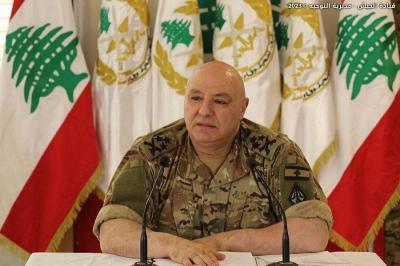Amid growing concerns that the ongoing confrontations in the south will prolong, coupled with an inability—both internally and externally—to achieve a political settlement that reshapes authority, extensive discussions have begun in diplomatic and internal circles regarding how to politically and administratively adapt institutions to current and upcoming realities. Given that new appointments are unlikely under a caretaker government and the absence of a president, there is a search for ways to again extend the terms of security and military leaders, as well as first-category employees. The focus here is primarily on the position of army commander, with discussions already initiated regarding extending the term of Army Commander Joseph Aoun for another year, as his current term ends in January 2025, according to "Al-Mudun."
The conversation opened six months prior to the expected date, influenced by various considerations. The topic has gained international and diplomatic attention, especially given the belief that Israeli Prime Minister Benjamin Netanyahu is determined to continue the war in Gaza past the U.S. elections; if he is betting on Donald Trump’s return to the presidency, this suggests that conflict is postponed until after the new year. Meanwhile, there is a clear Lebanese rejection against achieving any political settlement to reshape authority before understanding the post-war situation, its repercussions, and results.
This situation is compounded by international concern for the southern region, necessitating a de-escalation or limitation of conflict to avoid slipping into a wider war, alongside a fundamental reliance on the role of the Lebanese Army. Thus, the idea of extending the army commander's term, along with that of other security heads and certain directors general, has emerged. During a recent visit to Washington, some figures and officials raised the possibility of extending Aoun’s tenure, and this idea reached Lebanese political forces whose opinions varied from support to rejection or proposing alternatives, such as entrusting his duties to the chief of staff or appointing a replacement.
In this context, the situation surrounding the military academy also emerged, with efforts highlighted to resolve it, especially since its paralysis creates a negative impression of Lebanon, which consistently declares in all forums that it needs to strengthen the army and introduce new elements for deployment in the south. The Lebanese are asking for external assistance to fulfill this need, thus impeding the outcomes from the military academy is not viable. The concept of opening a new recruitment round for the academy has been suggested as a way to resolve the ongoing conflict between the army commander and the minister of defense.
Within this proposition, negotiations have begun aimed at addressing the issue in exchange for a serious discussion about extending the army commander's term, indicating a retreat from denying the call to reopen recruitment for the military academy in return for an extension. However, opponents of the extension suggest that the defense minister withdraw his appeal against the chief of staff, consequently allowing the chief of staff to assume the army commander's powers officially.
There are also discussions involving the Free Patriotic Movement and its leader, Gebran Bassil, concerning this notion should he wish to avoid the option of extending the army commander’s term, which is part of the broader open dialogue in the country. Conversely, there is a prominent inclination—aligning with regional and international interests—pointing toward the necessity of extending the army commander's term under the current circumstances.
These are not the only detailed ideas circulating within the country, as the political background is also filled with discussions aimed at formulating a settlement or a deal under the presidential settlement framework, given that this is currently unattainable. Furthermore, discussions also touch upon early parliamentary elections or the possibility that presidential elections will be delayed until the end of the parliamentary council’s term. Some parliamentary blocs are exploring new ideas related to amendments to the electoral law, amidst a contention between the Free Patriotic Movement’s insistence on allocating six seats for diaspora representation versus proposals to abolish them again, along with further discussions regarding altering the requirement for two preferential votes instead of one. All of this falls under the umbrella of “filling political time” while awaiting a resolution to the trajectory of the war in Gaza and clashes in the south, according to "Al-Mudun."




